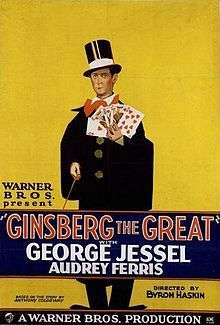Ginsberg the Great
| Ginsberg the Great | |
|---|---|
 Movie poster | |
| Directed by | Byron Haskin |
| Written by | Anthony Coldeway (story & scenario) |
| Starring |
George Jessel Audrey Ferris Gertrude Astor |
| Cinematography | Conrad Wells |
| Edited by | Clarence Kolster |
Production company | |
| Distributed by | Warner Bros. Pictures |
Release dates | November 26, 1927 |
Running time | 60 minutes |
| Country | USA |
| Language | English (Intertitles) |
Ginsberg the Great is a lost[1][2] 1927 silent film starring George Jessel in the period in which he made films with Warner Bros.. The film had a Vitaphone synchronized music score and sound effects.[3]
Synopsis
Johnny Ginsberg, a tailor's apprentice who aspires to be a famous magician, joins a carnival troupe that stops in the town and doubles for sideshow attractions. The troupers, actually a gang of thieves, direct their chimpanzee to pick the pockets of Sam Hubert, a theatrical magnate who is in the audience, but Johnny recovers the wallet. Sappho, an Oriental dancer, learning that Hubert has purchased the Russian crown jewels, vamps Johnny into taking her to his home; and with the aid of the gang, she steals the jewels. Overhearing the gang quarreling over the spoils, Johnny tries to make a getaway with the gems, knocking out each member of the gang separately and affixing to each of them a tag signed "Ginsberg the Great." Hawkins, a newspaperman, publicizes the event, and Johnny consequently receives a reward and a contract from Hubert.
Cast
- George Jessel as Johnny Ginsberg
- Audrey Ferris as Mary
- Gertrude Astor as Sappho
- Douglas Gerrard as Sam Hubert
- Jack Santoro as Hawkins
- Theodore Lorch as Charles Wheeler
- Jimmie Quinn as Crook
- Stanley J. Sandford as Hercules
- Akka as a chimpanzee
See also
References
External links
- Surviving Vitaphone soundtrack disk reel 7 at SoundCloud
- Ginsberg the Great at the Internet Movie Database
- synopsis at AllMovie